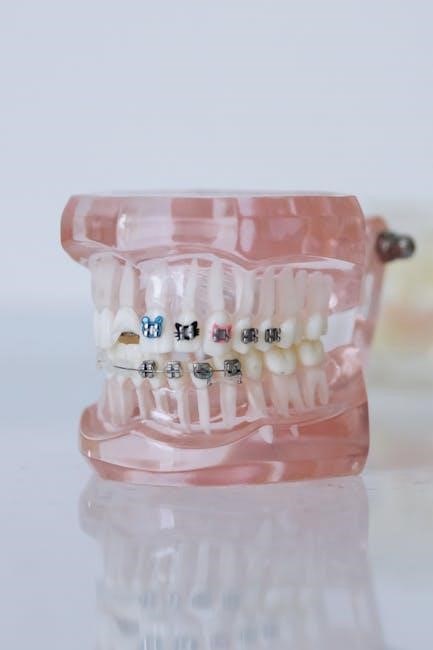Proper denture care involves regular cleaning, storage, and maintenance to ensure longevity and comfort. Cleaning removes plaque, while storing dentures correctly prevents damage. Regular check-ups maintain proper fit and oral hygiene, ensuring a healthy smile.
Importance of Proper Denture Maintenance
Proper denture maintenance is crucial for ensuring comfort, functionality, and oral health. Neglecting denture care can lead to plaque buildup, which may cause infections, bad breath, and discomfort. Regular cleaning prevents the accumulation of bacteria and stains, maintaining the appearance and fit of dentures; Improperly maintained dentures can cause irritation, mouth sores, or even shifts in alignment, affecting chewing and speaking abilities. Additionally, poor maintenance may lead to damage, requiring costly repairs or replacements. Proper care also supports gum and natural tooth health, especially for partial denture wearers. By following denture care instructions, users can prevent these issues and enjoy a healthier, more confident smile. Regular maintenance ensures dentures remain a reliable and comfortable solution for restoring dental function and aesthetics.
Common Challenges in Denture Care
Many individuals face challenges when maintaining their dentures, such as difficulty removing plaque and stains. Improper cleaning techniques or using abrasive products can damage the denture material. Additionally, some users may find it hard to adapt to the routine of soaking and rinsing dentures nightly. Others may experience discomfort or loose fit due to poor maintenance. Handling dentures requires care to avoid accidental drops, which can cause breaks. Moreover, some users may not follow the manufacturer’s instructions for cleaning solutions, leading to inadequate disinfection. Ensuring dentures are stored properly to maintain shape and hygiene is another common issue. Addressing these challenges involves education on proper techniques and adherence to care instructions to prevent complications and extend denture lifespan. Regular professional check-ups can also help mitigate these issues.
Overview of Denture Care Instructions
Proper denture care involves a combination of daily cleaning, storage, and regular maintenance to ensure comfort, hygiene, and longevity. Daily cleaning includes brushing with mild soap and water or using denture-specific cleaners to remove plaque and stains. Soaking dentures overnight in a cleansing solution helps disinfect and maintain their shape. Rinsing thoroughly before reinsertion is crucial to remove any cleaning solution residue. Storage should be in a protective container to prevent damage. Regular dental check-ups ensure the dentures fit properly and address any issues early. Additionally, using denture adhesives as directed can enhance stability. Proper care prevents infections, bad odors, and damage, ensuring a healthy smile and comfortable fit. Following these steps consistently helps maintain oral hygiene and extends the life of your dentures. Always refer to your dentist’s guidance for personalized advice.
Daily Cleaning Routine
Daily cleaning removes plaque, bacteria, and stains, ensuring dentures remain hygienic and comfortable. Use a soft-bristled brush with mild soap or denture cleaner, rinse thoroughly, and dry.
Brushing Dentures with Mild Soap
Brushing dentures with mild soap is essential for maintaining hygiene and longevity. Use a soft-bristled toothbrush or a denture brush to gently scrub all surfaces, including the underside and edges.
Avoid using toothpaste, as it can scratch the denture material. Instead, apply a small amount of mild liquid soap to the brush and clean thoroughly.
Pay special attention to areas where the denture adheres to the gums, as plaque tends to accumulate there. Rinse the dentures under warm or cool running water to remove soap residue.
After brushing, inspect the dentures for any remaining stains or food particles. Regular brushing helps prevent bacterial buildup and maintains the denture’s appearance.
Using Denture Cleaning Solutions
Denture cleaning solutions are designed to remove plaque, bacteria, and stains effectively. Soak your dentures in a solution specifically made for dentures, following the manufacturer’s instructions.
Typically, dentures should soak for 15–30 minutes. Avoid using household bleach or harsh chemicals, as they can damage the material. Always rinse dentures thoroughly with water after soaking.
For tough stains, some solutions may require longer soaking times. Ensure the product is suitable for your denture type, as certain materials may react negatively to specific chemicals.
After soaking, gently brush the dentures with a soft-bristled brush to remove any remaining debris. This step ensures a thorough clean and maintains the denture’s appearance.
Regular use of cleaning solutions helps prevent bacterial buildup and keeps dentures fresh. Always follow the recommended guidelines for optimal results.
Rinsing and Drying Dentures
Rinsing your dentures thoroughly is a crucial step in their daily care. After brushing or soaking, rinse them under cool or warm running water to remove any remaining debris or cleaning solution.
Use a soft-bristled toothbrush to gently scrub all surfaces, ensuring no residue is left behind. Avoid hot water, as it may warp or damage certain denture materials.
After rinsing, dry your dentures with a soft, clean cloth to prevent water spots. This step also helps reduce bacterial growth that can occur in moist environments.
When not in use, store dentures in a protective container filled with water or a soaking solution to maintain their shape and hygiene.
Proper rinsing and drying help maintain the cleanliness and longevity of your dentures, ensuring they remain comfortable and functional for years to come.

Storage and Handling
Store dentures in a protective container filled with water or a soaking solution to maintain shape and hygiene. Avoid dropping them to prevent damage.
Storing Dentures Overnight
Storing dentures overnight is crucial for maintaining their shape and hygiene. Soak them in a denture cleaning solution or water, following the manufacturer’s instructions. This helps remove plaque and bacteria. Use a denture bath or container to prevent warping. Avoid using hot water, as it may cause damage. Gently rinse dentures before soaking to ensure cleanliness. If using a solution, follow the recommended duration to avoid discoloration or damage. Always store dentures in a safe place to prevent accidental breakage. Cleaning and soaking overnight ensures dentures remain fresh and comfortable for the next day. Proper storage also supports oral health by preventing bacterial buildup.
Using a Denture Bath or Container
A denture bath or container is essential for safe and effective storage. These are specifically designed to hold dentures securely, preventing warping or cracking. Most baths are made of hard plastic and often include a lid to keep the dentures submerged during soaking. Always clean the container regularly with mild soap and water to avoid bacterial growth. Before placing your dentures in the bath, rinse them thoroughly to remove loose debris. Fill the bath with the recommended cleaning solution or water, ensuring the dentures are fully covered. Avoid using abrasive cleaners or hot water, as they may damage the dentures or the container. Proper use of a denture bath helps maintain hygiene and extends the life of your dentures. Regularly rinsing and drying the container ensures a clean environment for storage.
Preventing Damage During Storage
Proper storage is crucial to prevent damage to your dentures. Always place them in a protective container or denture bath when not in use. Avoid exposing dentures to extreme temperatures, as this can cause warping or cracking. Never store dentures in a dry environment, as they may become brittle and prone to breakage. Instead, soak them in a cleaning solution or water, following the manufacturer’s instructions. If using a denture bath, ensure it is clean and free from bacteria by rinsing it with mild soap and water regularly. Avoid placing dentures near pets or children to prevent accidental damage. Handling them gently and avoiding rough movements can also help maintain their integrity. By following these steps, you can protect your dentures from damage and ensure they remain in good condition for years to come.

Maintenance and Repairs
Regular maintenance ensures proper fit and functionality. Professional repairs address cracks or worn areas, preventing further damage. Adjustments enhance comfort and extend denture longevity. Regular inspections are crucial.
Regular Check-Ups for Denture Fit
Regular check-ups ensure dentures fit comfortably and function properly. Over time, gums and bone shrink, altering the fit. Dentists assess for looseness or irritation. Adjustments are made to maintain proper alignment and prevent issues like sore spots or difficulty chewing. These visits are crucial for long-term oral health and comfort. Proper fit prevents complications and extends denture lifespan.
Adjusting Dentures for Comfort
Adjusting dentures ensures a comfortable fit and prevents discomfort or irritation. Over time, the shape of the mouth changes, requiring modifications. Dentists may trim excess material or reline dentures for better alignment. Proper adjustments prevent sore spots. Using denture adhesives can improve stability. Regular adjustments maintain proper function and comfort, ensuring dentures feel natural. If discomfort persists, consult a dentist for professional adjustments.
Professional Denture Repairs
Dentures, while durable, can break or wear down over time, requiring professional repairs. If your dentures crack, chip, or become loose, contact a dentist promptly to avoid further damage. At-home repairs, such as using glue, can harm the denture and are not recommended. A dental professional will assess the damage and use specialized tools to fix or replace damaged parts. They may reshape or reline the denture for a better fit. Regular inspections can help identify issues early, preventing costly repairs. Professional repairs ensure your dentures function properly and remain comfortable. Neglecting repairs can lead to discomfort or further damage. Always rely on a qualified dentist for adjustments or fixes to maintain the longevity of your dentures. Proper care and timely repairs are essential for optimal performance and satisfaction.

Dental Check-Ups and Oral Hygiene
Regular dental visits ensure proper fit and function of dentures, while maintaining gum and natural tooth health. Brushing gums and natural teeth twice daily prevents infections and promotes overall oral hygiene.
Importance of Regular Dental Visits
Regular dental visits are crucial for maintaining the health of your mouth and ensuring the proper fit of your dentures. Over time, changes in your jawbone and gums can affect how your dentures fit, potentially causing discomfort or instability. Dentists can assess these changes and make necessary adjustments to restore comfort and functionality. Additionally, regular check-ups help identify and address issues like oral infections or gum disease early, preventing more severe complications. Dentures can accumulate bacteria and plaque, which, if not properly managed, may lead to bad breath or gum irritation. By visiting your dentist regularly, you can receive personalized advice on denture care and ensure your overall oral health remains optimal. These visits are essential for maintaining both the longevity of your dentures and the well-being of your mouth.
Caring for Gums and Natural Teeth
Even with dentures, it is essential to care for your gums and natural teeth to maintain overall oral health. Brushing natural teeth twice a day with fluoride toothpaste helps prevent decay and strengthens enamel. If you have partial dentures, ensure natural teeth are cleaned thoroughly to avoid plaque buildup. After meals, encourage rinsing or brushing to remove food particles. Massaging gums gently with a soft-bristled toothbrush can improve blood circulation and keep tissues healthy. For individuals without natural teeth, use a soft cloth or gauze to clean the gums, tongue, and palate. Regularly cleaning these areas prevents bacterial growth and bad breath. Proper care of gums and natural teeth ensures a stable foundation for dentures and promotes long-term oral hygiene. By maintaining these habits, you can enjoy a healthier, more comfortable smile.
Using Denture Adhesives
Denture adhesives enhance stability and comfort, offering a secure fit. They come in paste, powder, or strips, following product instructions ensures proper application and effectiveness.
Types of Denture Adhesives
Denture adhesives are available in various forms, including pastes, powders, and sticky strips. Paste adhesives are applied directly to the denture surface, providing a strong, lasting bond. Powders are sprinkled on the denture and moistened with saliva or water, offering a secure fit. Sticky strips are placed between the denture and the gum, creating a cushion-like effect. Each type caters to different preferences and needs, ensuring comfort and stability. Proper application following product instructions is crucial for optimal results. These adhesives help enhance the overall wearing experience, providing confidence and ease for denture users.
Applying Adhesives Correctly
Applying denture adhesives correctly enhances comfort and stability. Start by cleaning and drying the denture surface to ensure proper adhesion. For pastes, apply a thin, even layer, avoiding the edges. With powders, sprinkle lightly and press the denture into place, allowing saliva to activate the adhesive. Sticky strips should be placed directly on the denture base, following the manufacturer’s guidelines. Avoid over-application, as excess adhesive can ooze out and cause discomfort. After application, gently bite down to secure the denture. Always follow the product instructions and avoid using adhesives as a substitute for poorly fitting dentures. Proper application ensures a secure fit, improving chewing efficiency and confidence. Regularly check and reapply as needed, especially after meals or if looseness occurs. This step-by-step approach helps maintain both functionality and comfort for denture wearers.

Living with Dentures
Living with dentures requires adaptation and consistent care to maintain comfort and functionality. Regular cleaning, proper storage, and adjustments ensure a natural fit and confident smile.
Adapting to New Dentures
Adapting to new dentures can take time, but with patience, you’ll achieve comfort and confidence. Initially, dentures may feel loose or unfamiliar, but as you get used to them, they’ll become a natural part of your daily life. Start with soft foods to ease into eating and speaking. Practice speaking in front of a mirror to adjust to any changes in pronunciation. Over time, your mouth muscles will learn to hold the dentures in place, improving both speech and chewing abilities. Regular follow-ups with your dentist are crucial to ensure proper fit and address any discomfort. By following these steps, you can smoothly transition to life with dentures and enjoy a healthy, vibrant smile.
Eating and Speaking with Dentures
Eating and speaking with dentures requires practice to regain confidence and comfort. Start with soft foods like yogurt, mashed potatoes, and cooked vegetables to ease into chewing. Cut food into small pieces and chew slowly using both sides of your mouth to distribute the force evenly. Avoid sticky, hard, or sharp foods initially, as they may dislodge or damage the dentures. Speaking may feel awkward at first, but practicing in front of a mirror can help. Focus on enunciating clearly and pronouncing words slowly. If certain sounds are challenging, repeat them to build muscle memory. Over time, your tongue and cheeks will adapt, improving speech clarity. Remember, patience is key—consistent practice will make eating and speaking with dentures feel natural and effortless.
Maintaining Oral Hygiene Without Dentures
Maintaining oral hygiene without dentures is crucial for overall mouth health. Gently brush your gums, tongue, and palate with a soft-bristled toothbrush to remove plaque and bacteria. This stimulates blood flow and prevents irritation. If you have natural teeth, brush them twice daily with fluoride toothpaste. After meals, rinse your mouth with warm water or an antibacterial mouthwash to eliminate food particles. Massaging your gums with a clean finger can also keep them healthy. Regularly cleaning any remaining natural teeth and surrounding tissues helps prevent infections. Avoid using harsh products that might irritate your mouth. By keeping your oral tissues clean, you create a fresh environment for your dentures when they are reinserted. Consistent oral hygiene practices ensure comfort and promote healing in your mouth.

Emergency Care for Dentures
Handle broken dentures with care to avoid further damage. Assess the extent of the break and contact a dentist or prosthodontist immediately for professional repair or replacement.
What to Do If Dentures Break
If your dentures break, handle them with care to avoid further damage. Gently gather all pieces and rinse them with cool or warm water to remove any debris. Do not attempt to glue or repair the dentures yourself, as this can cause permanent damage. Contact a dentist or prosthodontist immediately to schedule an urgent appointment. Explain the situation to ensure priority attention. Until professional repair, avoid wearing the broken dentures to prevent discomfort or injury. Temporary solutions, like dental wax, may be recommended, but only as a last resort. Professional repair is essential for proper fit and functionality. Regular dental check-ups can help prevent such incidents by ensuring dentures remain in good condition. Prompt action ensures your dentures are restored quickly, maintaining your oral health and confidence.
Proper denture care is essential for maintaining oral health, comfort, and the longevity of your dentures. Regular cleaning, storage, and maintenance ensure that your dentures remain functional and comfortable. If issues arise, such as breaks or discomfort, seek professional help promptly to avoid further complications. For additional guidance, refer to resources like the Denture Care Instructions PDF, available from dental clinics or online platforms. These guides often include step-by-step cleaning routines, storage tips, and emergency care advice. Many dental associations and manufacturers, such as Perflex Ltd., provide detailed care manuals. Always follow the manufacturer’s instructions for cleaning solutions and adhesives. By adhering to these practices, you can enjoy a healthy, confident smile with your dentures.
